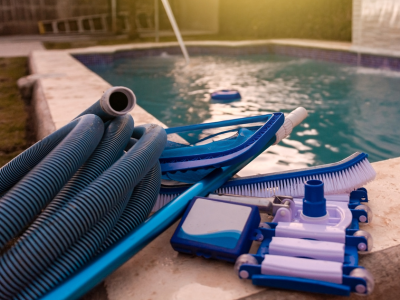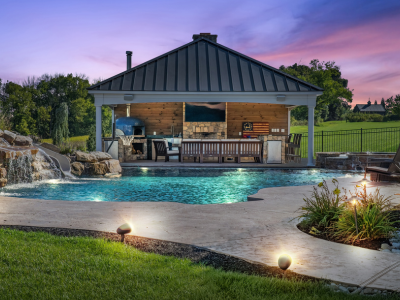A personal in-ground pool is an enticing idea. Whenever you want to swim, you only have to step out the back door. Meanwhile, your kids will have an accessible activity away from their devices and screens.
Home pools are relatively rare, so an in-ground installation automatically puts you in a select group. A study by RubyHome found that 8% of American households have a pool, and approximately 6 million are permanent in-ground constructions.
Pool ownership is relatively low for a reason. Pools are expensive, and if you purchase a house with an existing swimming area, you will need to spend time and money on maintenance and repairs. In other words, owning a pool is an ongoing commitment. It could be worthwhile if you understand these requirements and can take full advantage of having a place to swim in your backyard.
Here are the variables to consider when deciding whether to buy a home with a pool.
How You Want to Use Your Pool
Before you purchase a home with a pool, you should envision how you intend to utilize this aquatic asset. When thinking about this topic, you should look beyond the swimming sessions. A pool and surrounding space can serve as a multifunctional space for recreation, relaxation, and entertainment.
-
The pool deck can become your go-to relaxation spot.
-
If you include additional space or amenities for entertaining guests, your pool can become your home's social hub.
-
You can incorporate your pool into events, making birthdays, holidays, and family barbecues easier to plan.
-
You might also want to research additional structures, like an outdoor kitchen, barbecue area, gazebo, or pool house.
By examining possible uses, you can decide if a home with a pool is right for you and if you will need to make changes or improvements to ensure it fits your lifestyle and needs.
Your Preferences Now and in the Future
While you may anticipate countless hours of enjoyment and family gatherings around the pool, you also need to be realistic about how much you and your family will use the space in the long term.
Here are some factors to consider when defining your current and future preferences.
-
Consider the size of your family, plans for children, and the likelihood of grandchildren or other relatives living nearby.
-
Look at your long-term financial plans. For instance, will your budget change after retirement, making extra expenses like pool maintenance difficult?
-
Define the swimming season so that you can see how much use you get out of the pool each year.
-
See how often you visit pools now. Families who are already enthusiastic swimmers may get more use out of a backyard pool.
-
Decide whether you can make swimming or other water activities part of your fitness regimen.
One final consideration is the age of your children. Swimming is the most popular recreational activity for kids ages 7 to 17, so if you have children entering this demographic group, they will have a full decade's use of the pool before moving on to other pursuits. By answering the other questions, you can decide if you will use the pool enough after this time to continue getting value out of owning it.
How To Maintain a Pool
 Before becoming a pool owner, it is crucial to grasp the requirements for pool maintenance. These costs include pool chemicals like chlorine, which you may need to add weekly based on weekly water tests.
Before becoming a pool owner, it is crucial to grasp the requirements for pool maintenance. These costs include pool chemicals like chlorine, which you may need to add weekly based on weekly water tests.
Electrical costs to run the pool pump and filter system, lighting, and heating will also add to the cost. Meanwhile, pool cleaning takes time or requires hiring a service for weekly or monthly skimming, scrubbing, and backwashing the pool filter.
These requirements may not be deal-breakers, but you should understand the commitment so that you can decide if you will use the pool enough to warrant spending time and money on upkeep.
The Costs of Maintaining a Pool
The ongoing costs of pool maintenance are another vital consideration. According to Home Advisor, the maintenance costs average $229 per year. This amount covers equipment, chemicals, water test strips, and other necessities. If you hire a maintenance pro, the average cost is $115 per visit.
Forbes puts the average cost for repairs at $900 and calculates the overall price for electricity, water, and other utilities at $1,800 to $3,200 per year. These expenses can be higher for larger pools or additional features like a heater.
These financial considerations can serve as a reality check and help you decide if you will get enough use out of the pool to warrant paying these costs.
Climate Considerations for Your Area
Your local climate affects pool ownership in three ways. Firstly, you will get the most value out of your pool in regions with long, sweltering summers. If you have shorter swimming seasons in your area, you need to seriously consider how often you will use your pool during the few hot months.
Second, if your region has harsh winters, you will need to spend time and money preparing the pool for winter. This process involves adding chemicals, covering the pool, and removing water or keeping it circulating to avoid freezing.
Finally, frequent rains or storms can increase the need for water tests, chlorine top-ups, and pool skimming to remove leaves and debris.
Liability and Insurance Concerns
Pool owners need to address safety and liability concerns. A pool may necessitate additional insurance and features like a fence, alarm, and lighting.
Insurance companies often classify pools as an attractive nuisance. This term describes features that attract people and pose safety concerns. Standard policies may or may not cover liability for pools and other elements in this category.
Insurers may require a rider for pool owners, though you may limit premium costs with safety features. For instance, you can childproof the area by installing a fence around the pool and an alarm that alerts you when someone enters the area. You will need to work with your insurance provider to confirm full liability coverage for your pool and to find ways to limit premium costs.
How a Pool Affects Real Estate Value
The question of whether a pool adds resale value to a home is nuanced and depends on multiple factors. To begin with, some local real estate markets may value pools more than others. The RubyHomes study mentions California and Florida as the states with the highest concentrations of home pools. These states have warmer climates and longer swimming seasons.
However, data from the National Association of Realtors (NAR) found that local markets trump climate. Some cities have a high “pool premium.” This term refers to the average price of a home with a pool versus the average cost of all houses. Pool premiums are highest in urban areas like New York City and small cities like Birmingham, Alabama, and Youngstown, Ohio. On the other hand, pools hurt sales prices in many California towns despite the overall popularity in the state.
You need to research the local market to ensure the pool does not harm your chances to increase equity in your home.
How to Make Your Pool Even Better
 A home pool can impact your lifestyle, social life, and level of outdoor activity. If you are going to invest in a home with backyard swimming, you should consider additional features and equipment to help you get the most value out of it.
A home pool can impact your lifestyle, social life, and level of outdoor activity. If you are going to invest in a home with backyard swimming, you should consider additional features and equipment to help you get the most value out of it.
Here are four areas to focus your improvements.
Add Storage for Equipment and Toys
Pools require chemicals and cleaning equipment. If you have kids, you will also have aquatic toys, flotation devices, and other age-appropriate equipment. You can keep the pool deck organized with a pool shed. This stand-alone building can house equipment, toys, and pumps, keeping the deck clean to maximize space.
Make Multifunctional Space
You can add features around the pool to maximize space and allow different uses besides swimming. For instance, you can add shade with umbrellas, a canopy, or a poolside pavilion. With this structure, you and your family or guests can lounge poolside in comfort even if you do not want to get in the water.
Build a Pool House
Adding a pool house can be practical, but it also opens the door to opportunities beyond storage. Pool equipment will only take up a small portion of the building. This house can double as an additional recreation area with game tables, a lounge, or even a home theater. If you host events or get-togethers often, an outdoor kitchen adjacent to the pool house can be a good investment.
Make It Your Own
If you can handle maintenance costs and requirements, you may find value in a house with a pool. While the water may be the main attraction, you can add other features and structures to diversify the space and use it year-round to relax, host guests, work out, and play in and out of the pool. These extras will allow you to really personalize the space and make it your own.

Facebook Comments Box